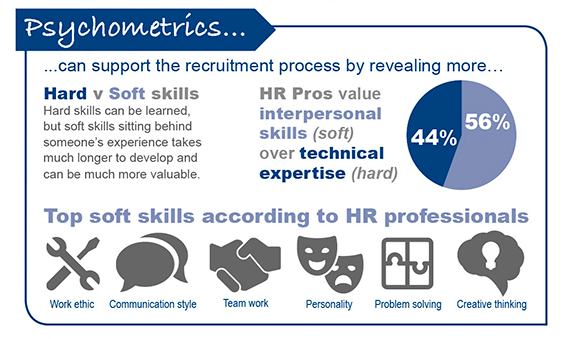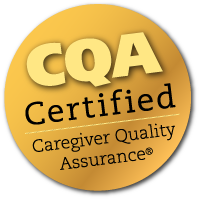By Jill Scott, Manager of Member Services
By now you know that we, at Leading Home Care, strongly believe in the use of pre-employment assessments and using them effectively in your recruiting and selection process. But, do you know what psychometric tests actually are and how you can use them to improve your selection efforts?
What are Psychometric Tests and How do They Work?
 Our friends at PeopleClues recently wrote a great blog post called “Psychometric tests: What are They” which provides a great description and discussion of psychometric tests. Psychometric tests analyze the soft skills of a person that may or may not come across in their application, resume or references. Further, many psychometric tests can be scientifically tailored to test soft skills needed for certain jobs in any given field. Soft skills are more intrinsic qualities while hard skills are learned or able to be learned skills. For example, our Caregiver Quality Assurance program is a proven selection system that we have tailored specifically for selecting caregivers in in-home care. The CQA assessments measure four sciences:
Our friends at PeopleClues recently wrote a great blog post called “Psychometric tests: What are They” which provides a great description and discussion of psychometric tests. Psychometric tests analyze the soft skills of a person that may or may not come across in their application, resume or references. Further, many psychometric tests can be scientifically tailored to test soft skills needed for certain jobs in any given field. Soft skills are more intrinsic qualities while hard skills are learned or able to be learned skills. For example, our Caregiver Quality Assurance program is a proven selection system that we have tailored specifically for selecting caregivers in in-home care. The CQA assessments measure four sciences:
- Attitude
- Behavior
- Cognitive ability
- Engagement
Nikky at PeopleClues provides the perfect summation of how psychometric assessments work. She says:
“Psychometrics provide a set of techniques to ensure the tests being carried out are fair to all involved, and to establish how accurate the test measurements are, so recruiters know how far they can trust the results when making a decision. They also ensure that recruiters really are testing what they think they’re testing – a numeracy test, for instance, should not be testing a candidate’s comprehension of complex vocabulary. An effective test is one which would yield the same result if taken by the candidate on two separate occasions or if administered by different people.”
Assessments that are not scientifically backed may or may not test the right things and may not provide consistent results, and that is where you can run into trouble. At one point Diane tried to “fool” our own assessments by taking it multiple times trying to get glowing results or to get horrendous job fit scores, but they are designed so well that we couldn’t fool it. We got the same results for each person each time no matter how hard we tried.
And What Can they do for our Company?
Over the years we have had a number of companies tell us that they are more likely to hire someone with a good heart and positive attitude (soft skills) because answering the phone and making sales calls are skills that they can learn in training. This is where a psychometric assessment comes in to play. Based on the responses from the applicant, the recruiter will receive a detailed report of the applicant’s assessment results along with their “job fit” score or how well the applicant matched up to each job benchmark.
 Companies that use the Caregiver Quality Assurance assessments will have applicants either take the assessments at the time that they complete their application or they will use them as an additional step in their recruiting process. For example: Applicant submits application, recruiter reviews application and references, then they have the applicant complete the assessments, then the recruiter receives the detailed report for the applicant. Once they move to the interview step, the recruiter will also have the option to receive a list of interview questions with the detailed report to use as part of the interview. Those questions help guide the recruiter to dig a little deeper about the responses to questions or situations presented during the assessment.
Companies that use the Caregiver Quality Assurance assessments will have applicants either take the assessments at the time that they complete their application or they will use them as an additional step in their recruiting process. For example: Applicant submits application, recruiter reviews application and references, then they have the applicant complete the assessments, then the recruiter receives the detailed report for the applicant. Once they move to the interview step, the recruiter will also have the option to receive a list of interview questions with the detailed report to use as part of the interview. Those questions help guide the recruiter to dig a little deeper about the responses to questions or situations presented during the assessment.
So what?
There are three big reasons why you want to improve the quality of caregivers you hire:
- Improved Client Satisfaction – The evidence is very clear that clients who develop a relationship with a caregiver they love stay with you longer, and report higher levels of satisfaction
- Reduced Turnover – Several years ago we worked with several home care company owners to create a tool to calculate the cost of a “bad hire.” The result is the “Bad Hire Calculator.” This tool shows us that is costs at least $1,575.00 for each caregiver you hire. If they leave within 90 days, that’s a bad hire. Turnover in home care in 2016 was 64.7% according to the newest edition of the Home Care Benchmarking Study from Home Care Pulse. Improving your selection process will help you reduce your caregiver turnover.
- Reduced Scheduler Burnout – Our research shows that the role of Scheduling Coordinator is a high stress job and schedulers are at risk for “burnout.” When you hire higher quality caregivers, reduce turnover, and increase client satisfaction, your schedulers are less stressed and more likely to stay on the job.
To see how this really works, take a demo of the Caregiver Quality Assurance assessment. Fill out the form below and you will receive a link to take the assessment as if you were an applicant. (Make sure to set aside 25-30 minutes of uninterrupted time to take the assessment.) You will then receive an email with your detailed report, job fit results and potential interview questions.
Once you have received your assessment report, we’ll then set up a time to review it with you and talk about how you can use this valuable tool to select better quality caregivers for your agency.



